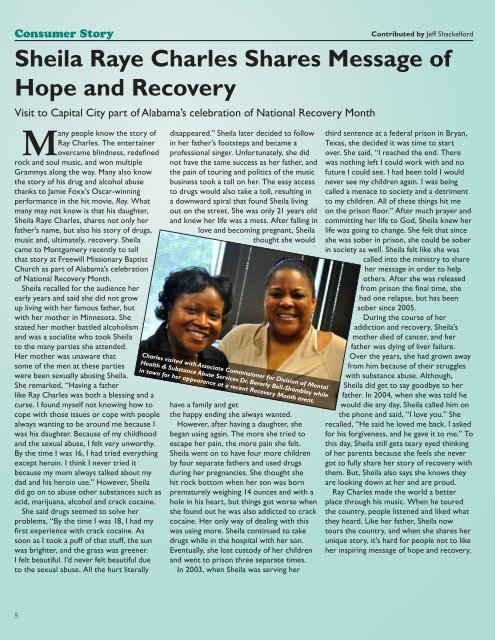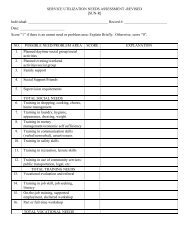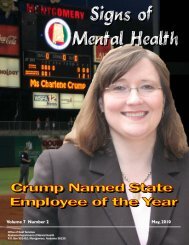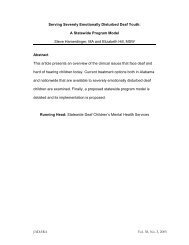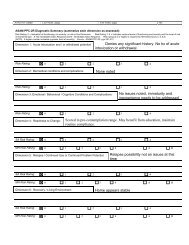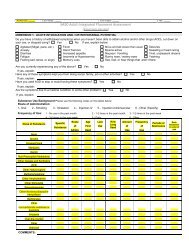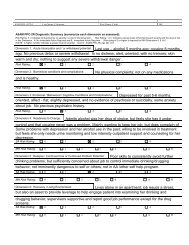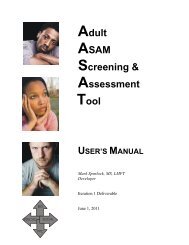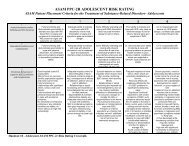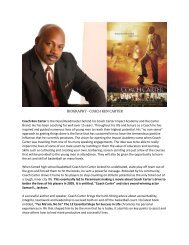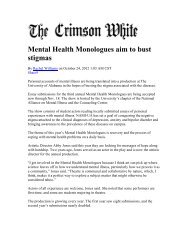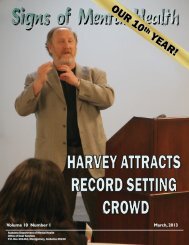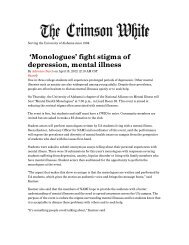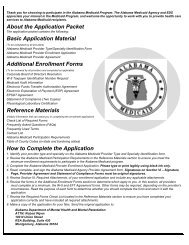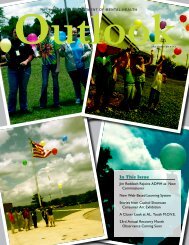4th Qtr - Alabama Department of Mental Health - Alabama.gov
4th Qtr - Alabama Department of Mental Health - Alabama.gov
4th Qtr - Alabama Department of Mental Health - Alabama.gov
Create successful ePaper yourself
Turn your PDF publications into a flip-book with our unique Google optimized e-Paper software.
Consumer Story<br />
Sheila Raye Charles Shares Message <strong>of</strong><br />
Hope and Recovery<br />
Visit to Capital City part <strong>of</strong> <strong>Alabama</strong>’s celebration <strong>of</strong> National Recovery Month<br />
Contributed by Jeff Shackelford<br />
Many people know the story <strong>of</strong><br />
Ray Charles. The entertainer<br />
overcame blindness, redefined<br />
rock and soul music, and won multiple<br />
Grammys along the way. Many also know<br />
the story <strong>of</strong> his drug and alcohol abuse<br />
thanks to Jamie Foxx’s Oscar-winning<br />
performance in the hit movie, Ray. What<br />
many may not know is that his daughter,<br />
Sheila Raye Charles, shares not only her<br />
father’s name, but also his story <strong>of</strong> drugs,<br />
music and, ultimately, recovery. Sheila<br />
came to Montgomery recently to tell<br />
that story at Freewill Missionary Baptist<br />
Church as part <strong>of</strong> <strong>Alabama</strong>’s celebration<br />
<strong>of</strong> National Recovery Month.<br />
Sheila recalled for the audience her<br />
early years and said she did not grow<br />
up living with her famous father, but<br />
with her mother in Minnesota. She<br />
stated her mother battled alcoholism<br />
and was a socialite who took Sheila<br />
to the many parties she attended.<br />
Her mother was unaware that<br />
some <strong>of</strong> the men at these parties<br />
were been sexually abusing Sheila.<br />
She remarked, “Having a father<br />
like Ray Charles was both a blessing and a<br />
curse. I found myself not knowing how to<br />
cope with those issues or cope with people<br />
always wanting to be around me because I<br />
was his daughter. Because <strong>of</strong> my childhood<br />
and the sexual abuse, I felt very unworthy.<br />
By the time I was 16, I had tried everything<br />
except heroin. I think I never tried it<br />
because my mom always talked about my<br />
dad and his heroin use.” However, Sheila<br />
did go on to abuse other substances such as<br />
acid, marijuana, alcohol and crack cocaine.<br />
She said drugs seemed to solve her<br />
problems, “By the time I was 18, I had my<br />
first experience with crack cocaine. As<br />
soon as I took a puff <strong>of</strong> that stuff, the sun<br />
was brighter, and the grass was greener.<br />
I felt beautiful. I’d never felt beautiful due<br />
to the sexual abuse. All the hurt literally<br />
disappeared.” Sheila later decided to follow<br />
in her father’s footsteps and became a<br />
pr<strong>of</strong>essional singer. Unfortunately, she did<br />
not have the same success as her father, and<br />
the pain <strong>of</strong> touring and politics <strong>of</strong> the music<br />
business took a toll on her. The easy access<br />
to drugs would also take a toll, resulting in<br />
a downward spiral that found Sheila living<br />
out on the street. She was only 21 years old<br />
and knew her life was a mess. After falling in<br />
love and becoming pregnant, Sheila<br />
thought she would<br />
Charles visited with Associate Commissioner for Division <strong>of</strong> <strong>Mental</strong><br />
<strong>Health</strong> & Substance Abuse Services Dr. Beverly Bell-Shambley while<br />
in town for her appearance at a recent Recovery Month event.<br />
have a family and get<br />
the happy ending she always wanted.<br />
However, after having a daughter, she<br />
began using again. The more she tried to<br />
escape her pain, the more pain she felt.<br />
Sheila went on to have four more children<br />
by four separate fathers and used drugs<br />
during her pregnancies. She thought she<br />
hit rock bottom when her son was born<br />
prematurely weighing 14 ounces and with a<br />
hole in his heart, but things got worse when<br />
she found out he was also addicted to crack<br />
cocaine. Her only way <strong>of</strong> dealing with this<br />
was using more. Sheila continued to take<br />
drugs while in the hospital with her son.<br />
Eventually, she lost custody <strong>of</strong> her children<br />
and went to prison three separate times.<br />
In 2003, when Sheila was serving her<br />
third sentence at a federal prison in Bryan,<br />
Texas, she decided it was time to start<br />
over. She said, “I reached the end. There<br />
was nothing left I could work with and no<br />
future I could see. I had been told I would<br />
never see my children again. I was being<br />
called a menace to society and a detriment<br />
to my children. All <strong>of</strong> these things hit me<br />
on the prison floor.” After much prayer and<br />
committing her life to God, Sheila knew her<br />
life was going to change. She felt that since<br />
she was sober in prison, she could be sober<br />
in society as well. Sheila felt like she was<br />
called into the ministry to share<br />
her message in order to help<br />
others. After she was released<br />
from prison the final time, she<br />
had one relapse, but has been<br />
sober since 2005.<br />
During the course <strong>of</strong> her<br />
addiction and recovery, Sheila’s<br />
mother died <strong>of</strong> cancer, and her<br />
father was dying <strong>of</strong> liver failure.<br />
Over the years, she had grown away<br />
from him because <strong>of</strong> their struggles<br />
with substance abuse. Although,<br />
Sheila did get to say goodbye to her<br />
father. In 2004, when she was told he<br />
would die any day, Sheila called him on<br />
the phone and said, “I love you.” She<br />
recalled, “He said he loved me back. I asked<br />
for his forgiveness, and he gave it to me.” To<br />
this day, Sheila still gets teary eyed thinking<br />
<strong>of</strong> her parents because she feels she never<br />
got to fully share her story <strong>of</strong> recovery with<br />
them. But, Sheila also says she knows they<br />
are looking down at her and are proud.<br />
Ray Charles made the world a better<br />
place through his music. When he toured<br />
the country, people listened and liked what<br />
they heard. Like her father, Sheila now<br />
tours the country, and when she shares her<br />
unique story, it’s hard for people not to like<br />
her inspiring message <strong>of</strong> hope and recovery.<br />
5


